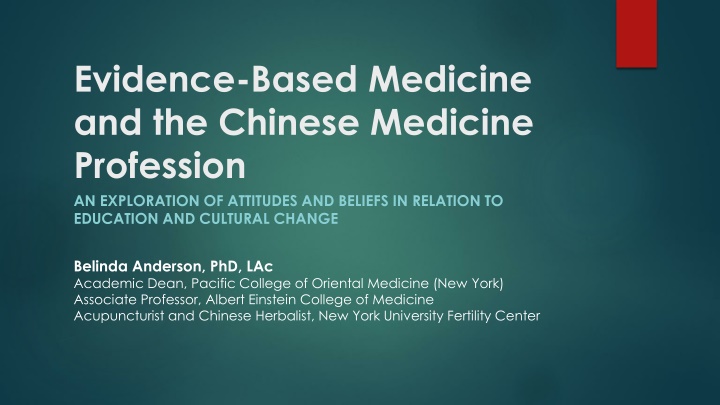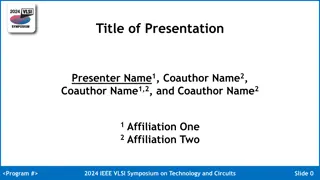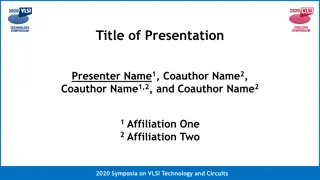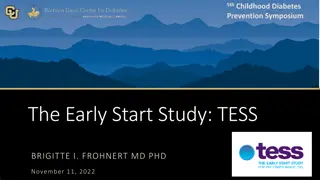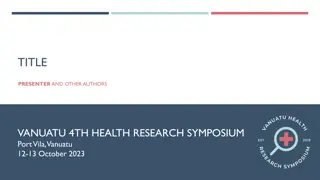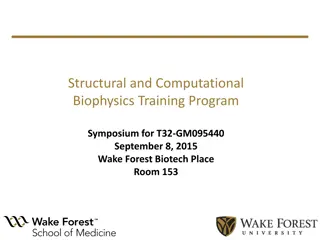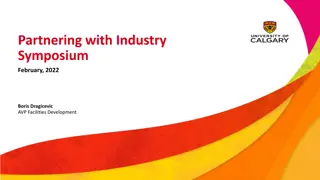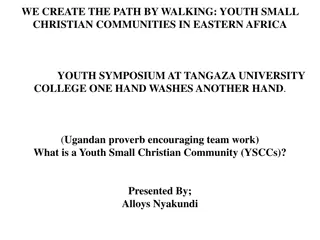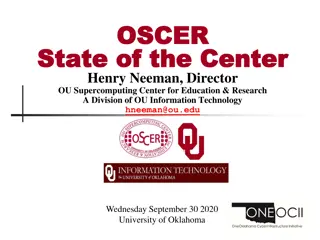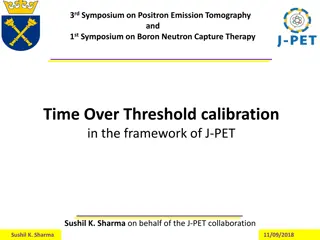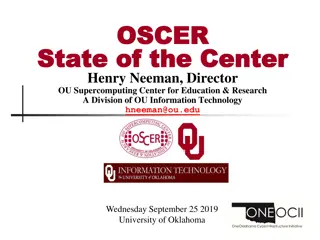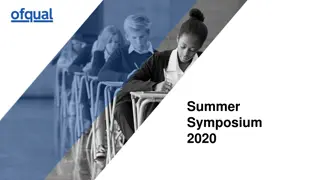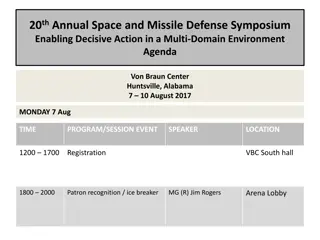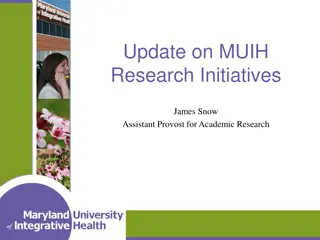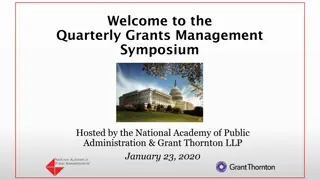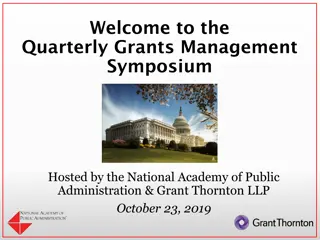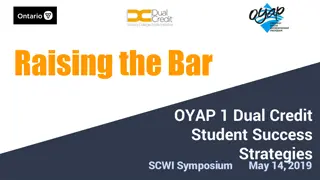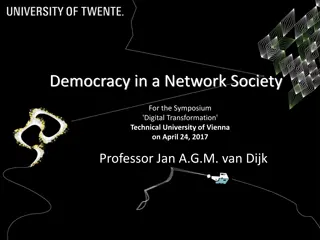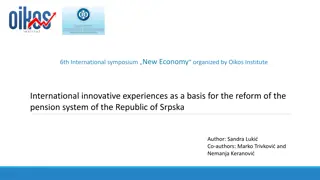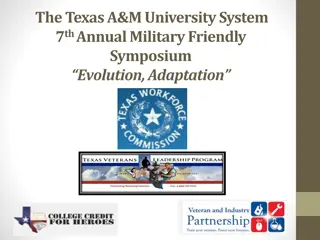Attitudes and Beliefs in Evidence-Based Medicine within Chinese Medicine Profession
This exploration delves into attitudes and beliefs regarding evidence-based medicine in the Chinese medicine profession, examining education, cultural change, and perspectives of MD and PCOM students. It covers the history of PCOM-NY's research involvement, current research projects funded by organizations like NIH and PCORI, and initiatives to integrate evidence-informed practice into curriculum. Components of the NIH EIP project are outlined, highlighting skills development for students and faculty.
Download Presentation

Please find below an Image/Link to download the presentation.
The content on the website is provided AS IS for your information and personal use only. It may not be sold, licensed, or shared on other websites without obtaining consent from the author.If you encounter any issues during the download, it is possible that the publisher has removed the file from their server.
You are allowed to download the files provided on this website for personal or commercial use, subject to the condition that they are used lawfully. All files are the property of their respective owners.
The content on the website is provided AS IS for your information and personal use only. It may not be sold, licensed, or shared on other websites without obtaining consent from the author.
E N D
Presentation Transcript
Evidence-Based Medicine and the Chinese Medicine Profession AN EXPLORATION OF ATTITUDES AND BELIEFS IN RELATION TO EDUCATION AND CULTURAL CHANGE Belinda Anderson, PhD, LAc Academic Dean, Pacific College of Oriental Medicine (New York) Associate Professor, Albert Einstein College of Medicine Acupuncturist and Chinese Herbalist, New York University Fertility Center
Content Brief history of how PCOM-NY got involved with research Current externally funded research projects NIH funded 5-year Evidence Informed Practice research project Pilot pre-grant data Qualitative exploration of attitudes, beliefs and perspectives Scientific worldview differences between MD and PCOM students Conclusions and lessons learned
Brief History My research background/history The NESA/Harvard NIH grant Partnering with Einstein Interprofessional student exchange program Faculty appointment 3 externally funded research grants
Current Research Projects NIH National Center for Complementary and Integrated Health K07 Career development award Evidence Informed Practice: Faculty and Curriculum Development 2013 2018 Patient Centered Outcomes Research Institute (PCORI) Acupuncture clinical trial 2015 - 2018 Health Resources and Services Administration (HRSA) Residency training program in wellness and prevention 2015 2018 Council of Colleges for Acupuncture and Oriental Medicine Investigating the scientific worldview differences between MD and PCOM students 2016 - 2017
Components EIP skills/knowledge Students Developed a Foundations of EIP (FEIP) course in all CM programs Pre and post tested self-reported skills/knowledge and importance Faculty Online EIP modules University of Minnesota FEIP course in doctoral upgrade program Incorporating EIP into 70% of didactic entry-level CM curriculum Incorporating EIP into 100% of clinical entry-level CM curriculum Attitudes/beliefs/perspectives Pre-grant pilot data Qualitative study
NIH EIP Project Pilot Data Surveys undertaken to provide data for the NIH proposal Exploring faculty and student s Research skills and usage Support for research Attitudes, beliefs and perspectives about evidence-based medicine
Pilot Data Survey Faculty 14 1 89% (102/115) 51% 41% Students 18 1 42% (176/420) 40% 34% # Close-ended Qs* # Open-ended Qs Response Rate Prior Research Ed. Prior Res. Ed. Grad Level * Close-ended questions with 5-point Likert answers (Strongly agree; Agree; Neutral; Disagree; Strongly disagree). Results expressed as %Agree + Strongly agree
Outcome of Surveys# (% strongly agree + agree) Faculty 75 88 73 Students 85* - - Research Literacy can find/evaluate Supportive of research Interest in participating in research & EIP Training EIP is of value to complementary & integrative medicine 81 76 *4th year students who had taken the introductory research course # Anderson et al. 2014. JACM 9:705; Anderson et al. 2016. Explore 12:366
Outcomes of Student Survey (% strongly agree + agree) Research Value Outside the profession* Compatibility of science & CM Desire for further research training 1st year 2nd year 3rd year 4th year Trend 83 85 82 80 NS 63 47 50 31 P<0.01 - - - 33 - * Referral, insurance coverage, public perception
Similar Survey at NESA and OCOM (Wayne et al. 2010. Explore 6:22) (% strongly agree + agree) Year 1 92 Year 2 85 Year 3 85 Trend NS Research value outside the profession Research learning & participation Research value to improving clinical practice 76 67 37 p<0.0008 87 76 45 p<0.005
Challenges Going in Resistance themes from open-ended survey questions Incompatible paradigms Cooptation Relevancy to CM practice Cultural issues These issues were not highlighted by the faculty needs analysis using the instrument developed at Northwestern Health Sciences University Suspected unique challenges within CM profession
Qualitative Study First cohort taking Fundamentals of Evidence Informed Practice as part of the doctoral upgrade program (DACM) Average years in practice 11.5 Analysis of online forums Based on Kaptchuk and Miller (2005). What is the most ethical model for the relationship between mainstream and alternative medicine: opposition, integration or pluralism? Academic Medicine. 2005, 80:286-290 They were asked to discuss the most ethical model for the relationship between mainstream and alternative medicine 31 of 33 students participated There were 33 initial posts (average 428 words/post), 127 response posts (average of four responses/initial post, with average length of response of 108 words).
Opposition/Integration/Pluralism (Kaptchuk & Miller 2005) Opposition - rejection of alternative medicine by conventional medicine Integration - amalgamating conventional and alternative therapies together in a holistic approach to the treatment of disease and promotion of wellness Pluralism - conventional and alternative therapies used together, but where cooperation, research, and open communication and respect between practitioners preserves the integrity of each of the treatment systems
Major Themes The goal above all else is that the patient gets the best care Western Medicine is in charge of our destiny, and that is due to their social, economic and political influences lie. All practitioners need to know when to refer out, and have an idea of where to refer explanations for how treatments work and therefore they become easily dismissed as invalid Western based science looks at the world by tearing it up into very small pieces that can be analyzed. By doing this to Eastern medicine, meaning and understanding are often The limitations of homogenizing two incongruous perspectives do a disservice to both. Interpreting a completely different system using a singular language is at best incoherent, and at worst, ineffective or harmful . explanations for things, but we don t always have quick It seems that education is key. In order for there to be respect and referrals among different modalities, we need to understand what each modality does, and where its strengths and limitations lost. Western medicine is interested in coming up with I choose pluralism as our best ethical option Major Themes Total # comments Total # & % of students that mentioned 23 21 (68%) Preference for the pluralistic model Opposition to integrative model Importance of patient centeredness Power imbalance &co-option issues Imp of interprofessional education Issues research methodology & paradigms 21 18 15 (48%) 17 (55%) 23 12 (39%) 13 10 10 (32%) 7 (23%)
this pluralistic streak in our own medicine has been integral to its continued evolution If I had to choose, I would choose pluralism, but this choice is only chosen, as the least damaging to the integrity of our medicine human mechanism Creating an environment where the patients ability to be part of the game and accommodate them when they are sub optimally resourced is something our medical practices and institutions should endeavor to be nimble and responsive to without judgement, agenda or manipulation . heralded in the West is the newest technology or drug, while heralded in the East is a lifetime of experience treating the Minor Themes Most of us had no idea about this term in our medical system prior to this class. We were all stuck on integration a strategy for functional relationship I do agree that opposition (at least ongoing opposition) is unethical and unreasonable as Minor Theme Total # of comments Total # & % of students that mentioned 4 (13% Pluralism requires patients be able to advocate for themselves Prior education focused on integrative model Against opposition model Pluralism maintains the integrity of CM Importance of thousands of years of anecdotal evidence Pluralism is also in CM 6 5 5 (16%) 5 3 5 (16%) 3 (10%) 3 2 (6%) 3 2 (6%)
Survey Instrument Validated - Thinking about Science Survey Instrument Cobern 2000 SLCSP 151. Kalamazoo, MI: Scientific Literacy and Cultural Studies Project Designed to measure differences in scientific worldviews - socio-cultural resistance to, and support for, science The instrument consists of 60 questions with 5-point likert scale answers Categories of Qs - epistemology; science and economy; science and the environment; public policy and science; science and public health; science, religion and morality; science, emotions and aesthetics; science, race and gender; and science for all
Research Questions Do MD and CM students have different scientific worldviews? Do students who chose, or not, to participate in the interprofessional exchange program have different scientific worldviews? Does an inter-professional student education exchange program change their scientific worldviews?
Outcomes Q Category Public policy Public health Epistemology Emotion & Aesthetics Economy Race & gender Science for all Environment/Resource Religion & morality # Qs statistically different 4 4 4 3 2 2 1 0 0 # agree/disagree 0 0 3 1 0 2 0 0 0 Response rates Einstein (122/170 = 72%; PCOM 48/107 = 45%)
Questions where Einstein & PCOM students were on opposite sides of neutral (3)* Q Category Public health Question Einstein* PCOM* 3.26 P Value 0.002 2.6 8. Scientific knowledge is the single most important factor in the improvement of medicine and public health. Race and gender 3.31 2.88 0.02 53. The scientific community is mostly dominated by white men and is often unfriendly to minority people. 60. Scientific knowledge is the truest form of knowledge. Epistemology Epistemology 3.32 3.66 2.67 2.81 0.001 <0.0001 33. The methods of science are the most reliable source of true, factual knowledge. Race and gender 3.35 2.92 0.01 23. The scientific community is mostly dominated by men and is often unfriendly to women. 42. Science is our best source of useful knowledge. Economy Epistemology 3.69 3.75 2.79 2.90 <0.0001 <0.0001 34. Science is the best source of reliable knowledge. *Means of Likert responses: Strongly agree = 5; Agree = 4; Neutral = 3; Disagree = 2; Strongly disagree = 1)
Conclusions and lessons learned CM students, faculty and practitioners: Are not anti science Understand and support the role of research in legitimizing CM But are concerned about: Autonomy and continued authentic practice of CM Cooptation Inappropriate research methodology being used for CM Keeping the patient at the center The need for interprofessional education to engender respect and understanding
Acknowledgments Research mentors Drs. Ben Kligler, Paul Marantz at Einstein Dr. Roni Evans, University of Minesotta Dr. Corbin Campbell, Teachers College Columbia University Research Colleagues Drs. Diane McKee, Arya Nielsen, Claudia Citkovitz, Funding bodies: NIH, PCORI, HRSA, CCAOM Institutional support: PCOM, Einstein, Teachers College Columbia University
Thank you Belinda (Beau) Anderson Pacific College of Oriental Medicine 110 William St, 19th floor New York, NY 10038 212 982 3456 x216 banderson@pacificcollege.edu
